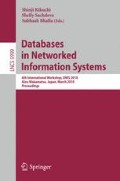Abstract
Social computing services, which enable people to easily communicate and effectively share the information through the Web, have rapidly spread recently. In the marketing research domain, buzz marketing sites as social computing services have become important in recognizing the reputation of products hold with users. This paper proposes a reputation analysis framework for the buzz marketing sites. Our framework consists of four steps: the first is to extract the topics of the product using natural language processing. The input data comprises consumer messages on buzz marketing sites. Next, important topics on the products are extracted. The third step is to detect emerging consumer needs by identifying new burst topics. Finally, the results are visualized. Based on our framework, product characteristics and emerging consumer needs are extracted and reputations are visualized.
Access this chapter
Tax calculation will be finalised at checkout
Purchases are for personal use only
Preview
Unable to display preview. Download preview PDF.
References
Morinaga, S., Yamanishi, K., Tateishi, K., Fukushima, T.: Mining product reputation on the web. In: Proceedings of the 8th ACM SIGKDD Intenational Conference on Knowledge Discovery and Data Mining (KDD 2002), pp. 341–349. ACM, New York (2002)
Yi, J., Niblack, W.: Sentiment mining in webfoutain. In: Proceedings of the 21st International Conference on Data Engineering (ICDE 2005), pp. 1073–1083 (2005)
Dave, K., Laurence, S., Pennock, D.M.: Mining the peanut gallery: Opinion extraction and semantic cllasification of product reviews. In: Proceedings of the 12th International World Wide Web Conference (WWW 2003), pp. 519–528. ACM, New York (2003)
Wiebe, J., Wilson, T., Bruce, R., Bell, M., Martin, M.: Learning subjective language. Computational Linguistics 30(3) (2004)
Gallery, M., Mckeown, K., Hirshberg, J., Shriberg, E.: Identifying agreement and disagreement in conversational speech; Use of bayesian networks to model pragmatic dependencies. In: Proceedings of 42nd Meeting of the Association for Computational Linguistics (ACL 2004), pp. 669–676 (2004)
Kamps, J., Marx, M., Mokken, R.J., Rijke de, M.: Using wordnet to measure semantic orientations of adjectives. In: Proceedings of the 4th International Conference on Language Resources and Evaluation, LREC 2004 (2004)
Turney, P.D.: Thumbs up? Thumbs down? Semantic orientation applied to unsupervised classification of reviews. In: Proceedings of the 40th Annual Meeting of the Association for Computational Linguistics (ACL 2002), pp. 417–424 (2002)
Nasugawa, T., Kanayama, H.: Acquisition of Sentiment Lexicon by Using Context Coherence. In: IPSJ SIG Notes, pp.109–116 (2004) (in Japanese)
Kaji, N., Kitsuregawa, M.: Dependency-based Probabilistic Model for Sentiment Classification. In: Proceedings of Data Engineering Workshop 2006 (2006)
Kakaku.com, http://corporate.kakaku.com/en/
Oguma, J., Utsumi, A.: Document clustering that uses co-occurrence information on word. In: Proceedings of the Annual Conference on JSAI (CD-ROM) (2007)
Arita, I., Kikuchi, H., Shirai, K.: Word Clustering Using Concurrent Search Queries. In: IPSJ SIG Notes, pp. 115–120 (2007)
Turney, P.D., Littman, M.L.: Unsupervised learning of semantic orientation from a hundred-billion-word corpus: NRC Technical report ERB-1094, Institute for Information Technology,11 pages (2002)
Takamura, H., Inui, T., Okumura, M.: Extracting Semantic Orientations of Words using Spin Model. In: Proceedings of the 43rd Annual Meeting of the Association for Computational Linguistics (ACL 2005), pp. 133–140 (2005)
Author information
Authors and Affiliations
Editor information
Editors and Affiliations
Rights and permissions
Copyright information
© 2010 Springer-Verlag Berlin Heidelberg
About this paper
Cite this paper
Hashimoto, T., Shirota, Y. (2010). Semantics Extraction from Social Computing: A Framework of Reputation Analysis on Buzz Marketing Sites. In: Kikuchi, S., Sachdeva, S., Bhalla, S. (eds) Databases in Networked Information Systems. DNIS 2010. Lecture Notes in Computer Science, vol 5999. Springer, Berlin, Heidelberg. https://doi.org/10.1007/978-3-642-12038-1_16
Download citation
DOI: https://doi.org/10.1007/978-3-642-12038-1_16
Publisher Name: Springer, Berlin, Heidelberg
Print ISBN: 978-3-642-12037-4
Online ISBN: 978-3-642-12038-1
eBook Packages: Computer ScienceComputer Science (R0)

